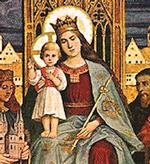Catechism of the Catholic Church
888 Bishops, with priests as co-workers, have as their first task "to preach the Gospel of God to all men," in keeping with the Lord's command. 415 They are "heralds of faith, who draw new disciples to Christ; they are authentic teachers" of the apostolic faith "endowed with the authority of Christ." 416
889 In order to preserve the Church in the purity of the faith handed on by the apostles, Christ who is the Truth willed to confer on her a share in his own infallibility. By a "supernatural sense of faith" the People of God, under the guidance of the Church's living Magisterium, "unfailingly adheres to this faith." 417
890 The mission of the Magisterium is linked to the definitive nature of the covenant established by God with his people in Christ. It is this Magisterium's task to preserve God's people from deviations and defections and to guarantee them the objective possibility of professing the true faith without error. Thus, the pastoral duty of the Magisterium is aimed at seeing to it that the People of God abides in the truth that liberates. To fulfill this service, Christ endowed the Church's shepherds with the charism of infallibility in matters of faith and morals. The exercise of this charism takes several forms:
891 "The Roman Pontiff, head of the college of bishops, enjoys this infallibility in virtue of his office, when, as supreme pastor and teacher of all the faithful - who confirms his brethren in the faith he proclaims by a definitive act a doctrine pertaining to faith or morals.... The infallibility promised to the Church is also present in the body of bishops when, together with Peter's successor, they exercise the supreme Magisterium," above all in an Ecumenical Council. 418 When the Church through its supreme Magisterium proposes a doctrine "for belief as being divinely revealed," 419 and as the teaching of Christ, the definitions "must be adhered to with the obedience of faith." 420 This infallibility extends as far as the deposit of divine Revelation itself. 421
892 Divine assistance is also given to the successors of the apostles, teaching in communion with the successor of Peter, and, in a particular way, to the bishop of Rome, pastor of the whole Church, when, without arriving at an infallible definition and without pronouncing in a "definitive manner," they propose in the exercise of the ordinary Magisterium a teaching that leads to better understanding of Revelation in matters of faith and morals. To this ordinary teaching the faithful "are to adhere to it with religious assent" 422 which, though distinct from the assent of faith, is nonetheless an extension of it.
Notes:
English Translation of the Cathechism of the Catholic Church for the United States of America © 1997, United States Catholic Conference, Inc.






